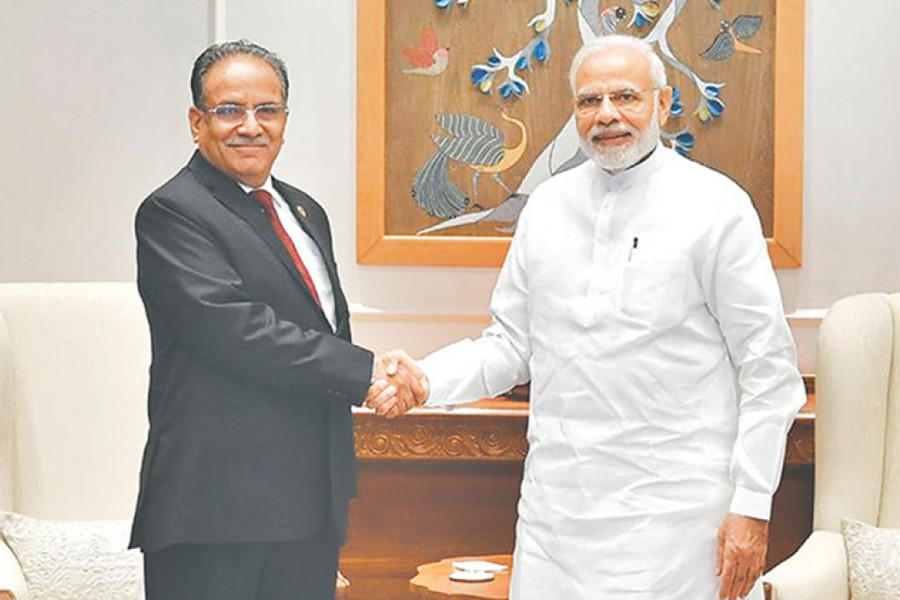Columns
Dahal’s Delhi ‘darshan’
Holding the decisive votes, Dahal was the kingmaker. Delhi thought ‘they could do business’ with him.
Biswas Baral
KP Oli is out on the street protesting as he cannot be in the seat of power in Singhadurbar. A big reason for the desperation of the leader of the opposition is his dismal standing with the south.
Starting with Matrika Prasad Koirala, the first post-Rana prime minister, Nepali heads of government have all internalised the need to humour India. Despite BP Koirala’s popularity in Nepal, Jawaharlal Nehru and Indian Ambassador CPN Singh had handpicked a ‘more mature’—and pliable—Matrika to be the prime minister in late 1951.
As Sagar Shumsher Rana recalls in his new book Kingdom Lost, following the thumping victory of the Nepali Congress in the 1959 national elections, even BP Koirala had to dispatch an emissary, Tulsi Giri, to India “to assure a nod from Nehru” for his prime minister bid.
To this day, it is a common belief that no Nepali prime minister can stay in the job for any time without India’s blessing. No more so than in the case of a leader who heads a party with just 32 members in the 275-member federal lower house. Once India’s bête noire, Pushpa Kamal Dahal ‘Prachanda’ has morphed into perhaps New Delhi’s most trusted leader in Nepal. What explains this sea change?
Dahal relentlessly fulminated against ‘expansionist’ India both during and after the insurgency. After entering mainstream politics, the Maoist supremo’s ties with New Delhi hit rock bottom following his abortive ouster of the then army chief Rookmangud Katawal in May 2009. India came to Katawal’s defence, and Dahal had to leave office in a huff.
A canny political operator, Dahal soon realised he could never climb atop Nepal’s political tree if he continued to annoy and antagonise India. To mend fences, he started sending feelers and meeting Indian bureaucrats and spies abroad. The overt overtures of the one-time revolutionary towards the Bharatiya Janata Party (BJP) top brass were rather embarrassing. New Delhi was still sceptical though.
Oli clears Dahal’s way
When the 2022 national elections resulted in a hung parliament, with neither the Nepali Congress, the largest party, nor the CPN-UML, the second largest, in a position to govern on their own, Dahal put forth his bid. The two-time prime minister felt he deserved another shot at premiership after being cheated out of it by KP Oli, who had broken their ‘gentleman’s agreement’ on rule-by-rotation. Oli had refused to resign as prime minister after completing his two and half years in office; Dahal was to lead the country for the rest of the Nepal Communist Party government’s five-year term. Crucial to securing the top post for Dahal would be India’s nod.
The pre-election Congress-Maoist coalition government under Sher Bahadur Deuba had made many concessions to India. They included handing over to it most of Nepal’s vital power projects, including the West Seti Hydropower Project and the Seti River Project in western Nepal, with a combined estimated cost of $2.4 billion.
Dahal wholeheartedly backed Deuba as he made these pivotal decisions. What had helped cement the Dahal-Deuba pre-election coalition was the rather triumphant anti-India posturing of Oli, whose relations with the south were irreparably damaged after his government in 2020 successfully pushed to include a map of ‘greater Nepal’ in the national charter.
New Delhi was now determined to keep Oli out of power. Following the November 2022 elections, as the holder of decisive votes, Dahal was in the position of a kingmaker. As important, by now, New Delhi had come to believe he was someone ‘they could do business with’. As the Maoist chief is close to completing a year in office, New Delhi reckons he is someone who can (for now) be trusted with ‘protecting Indian interests in Nepal’.
Dahal has earned this faith the hard way. He has refrained from signing agreements of long-term import with China, especially under the Belt and Road Initiative (BRI) that India views with suspicion. During his recent China visit, the two countries inked a dozen deals, but none under the BRI. The BRI project implementation plan, which he was supposed to sign in Beijing, was indefinitely shelved.
The China trip turned out to be no more than a goodwill visit. The one-time India-baiting guerilla leader seems to have realised that in the new South Asian geopolitical landscape, it is impossible to ‘balance’ India and China, whose relations have not been the same since the 2017 Doklam border standoff. India after that has come to be even more possessive of its ‘backyard’. This, above all, entails minimising China’s presence here.
The once champion of secularism has also tried to flaunt his Hindu credentials before the BJP and Rashtriya Swayamsevak Sangh stalwarts. On his India visit, which preceded the trip north, the saffron-clad Nepali prime minister knocked the doors of the Shree Mahakaleshwar Temple in Madhya Pradesh. Even while he was in China, Dahal made time to call on Lord Shiva’s mythological abode in Kailash-Mansarovar in Tibet.
Still going strong
Although the voices of disgruntlement against the government have been building even within the ruling coalition, on the eve of its first anniversary, there are no signs of its imminent demise. Right now, the Dahal cabinet has representatives from the Congress, the Maoist Centre, the CPN (Unified Socialist), and four other Madhes-based parties.
New Delhi appears to have impressed on Deuba its comfort with the current dispensation in Kathmandu and that the Congress should do nothing to destabilise it. The same message has been conveyed to the Madhesi outfits supporting the coalition government. (And to keep Dahal honest, India now has Durga Prasai and other monarchists who suddenly seem to have gotten a second wind. It does not need Oli.)
The next set of federal elections are four years away. In the current setup, it will be difficult for the UML to come back into the government, much less for Oli to be the prime minister again.
Geopolitics will continue to shape events in Nepal. In fact, its importance in domestic politics is set to increase. It will not be an exaggeration to say that following the implosion of the Nepal Communist Party in 2021, China is struggling to find a firm foothold in Nepali politics while the Indian footprint continues to grow. Dahal would not change that for all the tea in China.




 8.22°C Kathmandu
8.22°C Kathmandu















